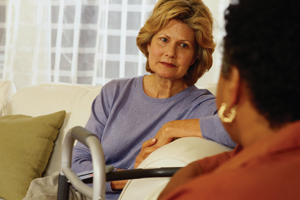
A project of the U.S. Department of Health and Human Services Office on Women's Health


As you and the people around you grow older, loss will become more common. You may have to cope with the death of a friend, spouse, parent, child, or beloved pet. Whether a death follows a long illness or is unexpected, you may experience a range of painful emotions, including:
You are likely to cycle through a variety of emotions, which is a normal part of grieving. You might also have physical symptoms of grief, such as upset stomach, no appetite, problems sleeping, or low energy.
Allowing yourself to grieve is vital to emotional healing after a major loss. Grieving can take months or even a few years. Expect that you may experience setbacks on holidays, birthdays, and anniversaries. These steps can help you to cope with your pain:
If you feel like you can't cope or if you are using alcohol or other substances to avoid the pain, get help from a friend, family member, clergy member, counselor, doctor, or support group.
If you are suicidal, or afraid you may become suicidal, seek help immediately.
Call the National Suicide Prevention Lifeline at 800-273-TALK (8255).
It's toll-free and available 24 hours a day, every day. Or call 911 or go to the emergency room — suicidal thoughts are an emergency.
Content last updated August 12, 2010.